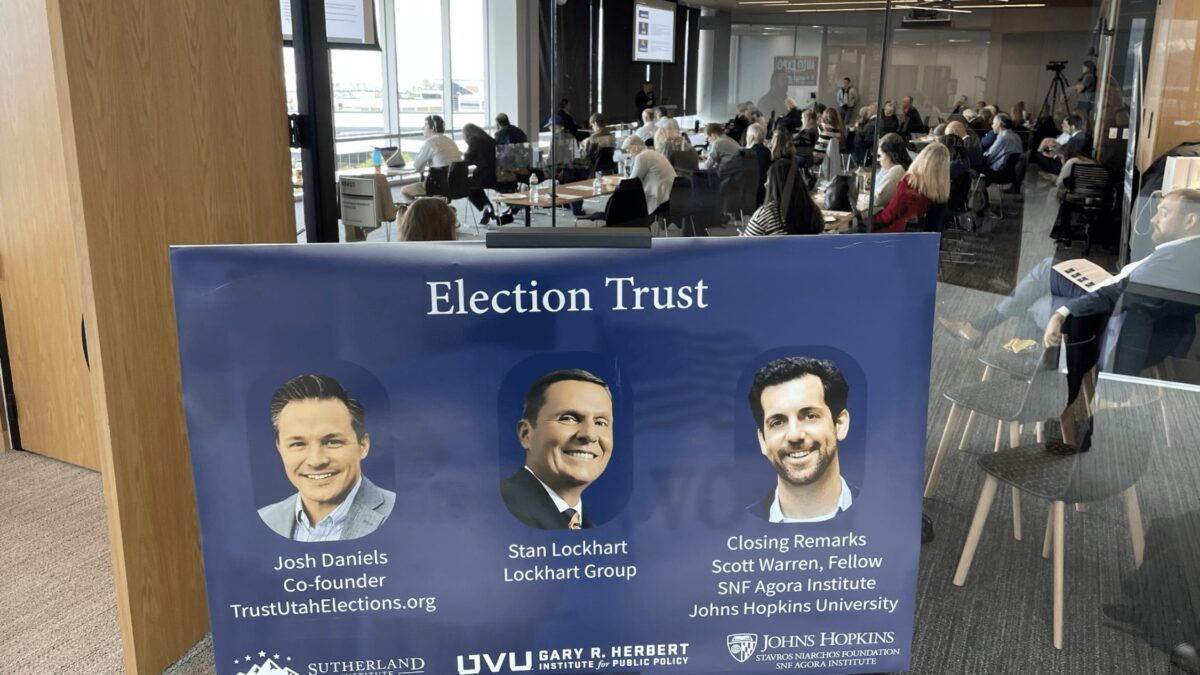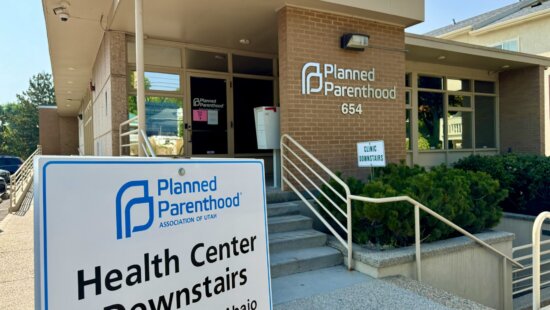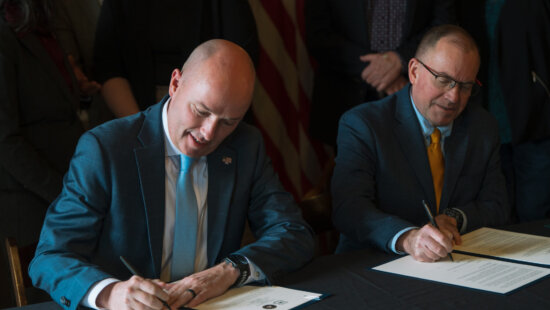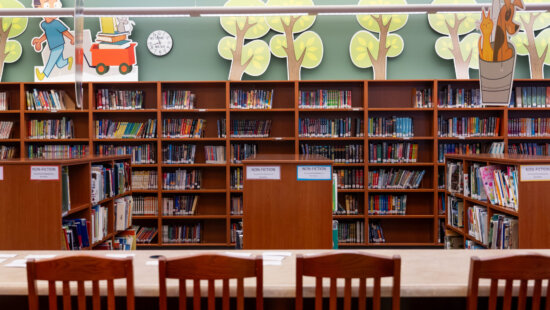Politics
Republicans are losing trust in elections, even in Utah. What should be done?

A forum on election trust takes place at Utah Valley University in Orem, Utah on Tuesday, May 7, 2024. Photo: Katie McKellar / Utah
Election officials, state and national experts explore solutions. They encourage those with concerns to learn about process intricacies, visit county clerks offices, volunteer as poll workers
By: Katie McKellar, Utah News Dispatch
Only 40% of Republicans are very or somewhat confident in the accuracy of U.S. elections — down from a peak of nearly 90% in 2006. Meanwhile 80% of Democrats and 67% of independent voters say they have confidence in U.S. elections.
That’s according to a poll of 2,012 Americans conducted by Gallup and Johns Hopkins University’s Stavros Niarchos Foundation Agora Institute in October.
Even Utah — a red state that adopted voting by mail well before COVID-19 and where polls historically have shown Utahns have high confidence in their local elections — isn’t immune to that trend, at least when it comes to presidential elections.
Consider these results from a new poll conducted by Gallup of 502 Utah adults between March 13 and March 22. It has a margin of error of plus or minus 4.83 percentage points:
- Most Utahns who identified themselves as conservatives (62%) aren’t confident that President Joe Biden legitimately won the 2020 election.
- Of that 62% of conservatives, 30% said they were “not at all confident” and 32% said they were “not too confident.”
- Only 37% of conservatives said they were confident that Biden won in 2020 (17% said they were “very confident” and 20% said they were just “confident”).
- That’s compared to 84% of Democrats saying they were “very confident” that Biden won the presidency while 11% said they were “confident” and only 4% said they were “not too confident.”
That Gallup poll was conducted as part of a partnership with the center-right think tank R Street and Johns Hopkins University’s Stavros Niarchos Foundation Agora Institute, which has been traveling across the U.S. to bring together election officials, scholars and others to build trust in elections.

The Utah poll results were unveiled Tuesday during an “election trust forum” held at Utah Valley University and hosted by the Gary R. Herbert Institute of Public Policy, the SNF Agora Institute, and the Sutherland Institute, a conservative public policy think tank based in Salt Lake City.
Concerns about those national and local poll results were at the forefront of the forum’s three hours of panel discussions, which convened the state’s top election officials and academic scholars to explore how to fix a problem they worried could spell trouble for the future of U.S. democracy if left unaddressed.
Is distrust in elections a ‘bipartisan problem’?
Utah Lt. Gov. Deidre Henderson and former Utah Gov. Gary Herbert both shared recorded video messages to kick off Tuesday’s discussions, urging everyone to work together to increase trust.
“Voter access and ballot security are paramount, especially in the age of some saying elections are illegitimate or have been stolen,” Herbert said. “Unfortunately this has become an all too common feature of campaigns, and it undermines our system of self government.”
Herbert didn’t mention him by name, but former President Donald Trump has been the most prominent politician to sow doubt in elections, continuing to wrongly claim that he won the 2020 election.
However, while moderating the first panel discussion Justin Jones, executive director of the Herbert institute, pointed to a December press release in which several top election officials, all Republicans, asserted growing distrust in elections was a “bipartisan problem” thanks to a “toxic stew of disinformation, misinformation and deliberate lies for profit or political advantage.”
“Both parties have helped weaken trust in our electoral system. Both must help restore it,” states the release, which was issued by Idaho Secretary of State Phil McGrane along with Henderson, Kentucky Secretary of State Michael Adams, Georgia Secretary of State Brad Raffensperger and Kansas Secretary of State Scott Schwab.
“As conservatives, we recognize the damage caused by the drumbeat of falsehoods repeated about the 2020 elections,” the joint statement said, not naming Trump but noting that even though the 2022 elections were “largely undisputed and noncontroversial, there are still many voters who don’t believe they can have confidence in the 2024 elections.”
“This is a bipartisan problem, though. Democrats have also sown doubt about high-profile election results in 2000, 2004, 2016, and 2018,” the statement said.
It included links to a 2012 New York Magazine commentary piece titled “Yes, Bush v. Gore Did Steal the Election,” a 2005 CNN story that reported a group of Democrats in Congress were challenging the counting of Ohio’s electoral votes, a 2019 Washington Post article quoting Hillary Clinton saying Trump was an “illegitimate president,” and a 2021 CNN story about Georgia Democratic gubernatorial candidate Stacey Abrams defending herself from criticism that she never conceded her 2018 loss to Gov. Brian Kemp due to voter suppression allegations.
“While Republicans acknowledge our responsibility,” the Republican election officials wrote, “it will take both parties to break the cycle and restore voter trust.”
McGrane came to Utah from Idaho to participate in Tuesday’s discussion. When asked why, then, polls have been showing election distrust is more prominent among conservatives than it is among other political partisans, McGrane said it all depends on who won (or lost) at the time.

“The seeding of distrust has actually been bipartisan in our country, it’s just come at different points in time,” McGrane said, adding that includes “calling for the removal of the electoral college because the popular vote had more people.”
Today, though, in the wake of Trump’s 2020 loss, the Jan. 6 attack on the U.S. Capitol, and now as Trump continues to sow doubt heading into the 2024 election, distrust in national U.S. elections among conservatives is reaching a concerning inflection point.
“We need to rally together and run our campaigns better,” McGrane said. “Better candidates. Better efforts. And that’s where a lot of the focus needs to be, not on challenging the process itself.”
Herbert urges Utah leaders to adopt ‘conservative principles’ to build elections trust
During his video recorded speech Tuesday, Herbert said “election integrity” was the first issue he asked the team at Utah Valley University’s institute named after him to study, and he pointed to several research papers that have since been published on the topic.
One of those papers detailed a review of Utah’s election laws and procedures, and the Herbert Institute researchers concluded Utah’s current election processes “make it highly unlikely that any appreciable level of election fraud could go undetected.”
Herbert said he and the Herbert Institute will continue to research and host forums on election integrity, “and we will continue to do so until we have worked to restore confidence in our elections process in our state, and in America.”
To advance that goal, Herbert encouraged attendees at Tuesday’s forum to adopt the “conservative principles for building trust in elections” that the SNF Agora Institute and R Street created after holding off-the-record meetings last year in Washington, D.C., Utah, Indiana and Texas with election officials, advocates and democracy scholars to “explore the contours of a pro-democracy movement for conservatives.”
Those conversations helped form the following principles meant to increase confidence in elections. They are:
- Publicly affirm the security and integrity of elections across the U.S. and avoid activity fueling doubt about elections in other jurisdictions.
- Use transparency and public outreach to reassure voters of election integrity.
- Champion policy changes that can help build trust in our elections system.
“No system is perfect,” Herbert said, “but in Utah we not only do it well, but we’re also one of the best in the nation.”
Like Herbert, Henderson also urged politicians to avoid casting doubt on elections through partisan rhetoric.
“Public discussions about how we elect our representatives should rise above polarized partisan talking points and be guided by sound principles and sound evidence,” Henderson said.
‘Be a champion,’ Henderson says, while looking for ways to improve
Henderson asserted Utah “leads the nation in elections administration by protecting voters’ constitutional right to the ballot in ways that reduce barriers, while also strengthening security measures to ensure each Utahn knows that their vote is counted securely, accurately and anonymously.”
Utah currently mails ballots to all active registered voters. The state began slowly implementing mail-in ballots starting back in 2012 to increase voter convenience and turnout, and didn’t see the same drama around voting by mail like in other states that had to hurriedly implement it in 2020 amid the pandemic.
There have been some legislative efforts in recent years to restrict Utah’s voting by mail system, with some Republicans wanting voters to have to request mail-in ballots rather than having them sent automatically, but they’ve been in the minority even among conservatives. This year, Utah’s Republican-controlled Legislature rejected attempts to curb or alter voting by mail in Utah.
Henderson said Utah’s current vote by mail system “contains more than 20 unique layers of security at the state and local levels, protecting against broad-based voter fraud or any attempts to affect the process improperly.”
“As we move into the 2024 election, it’s essential for all of us to continue to promote Utah’s strong track record of election integrity while we strive to continue to improve (the system) so citizens can continue to have high levels of trust,” she said.
Henderson added it’s important to remember elections are conducted locally — not nationally — and she encouraged everyone in the room to “be a champion of our election system.”
“Encourage every voter you interact with to educate themselves about the process and cast an informed vote,” she said. “I encourage everyone who has questions about how Utah’s elections are done to visit their local county clerk or volunteer as an election worker.”
Some people who came to Tuesday’s forum — a couple of them identifying themselves as Republican delegates — visibly scoffed or bristled at comments that Utah’s election system should be lauded.
One man, Aaron Ritchey, a Republican delegate from Logan, raised his hand toward the end of the discussion and said, “I think a lot of the issue is where ballots are going,” leading him to ask, “is it more important to have quantity of voters or is it more important to have a quality voter?”
“That’s a big philosophical question,” said Josh Daniels, former Utah County clerk who was presenting about a new nonprofit called Trust Utah Elections, meant to create a platform that promotes election “transparency, shares vital election information, and builds a coalition of individuals and organizations dedicated to the principles of fair and secure elections,” according to its website.

“Fundamentally,” Daniels told Ritchey, “our country is founded on this idea of self-government, right? The people — which is all people — are governed by this government entity, and for self government to really matter we all have a responsibility to participate. And a big part of how we do that is through voting. But yeah, good philosophical question.”
“It’s individual responsibility,” Ritchey said, “not the responsibility of the government to make sure everybody votes.”
Ritchey’s question stabbed at a long-debated issue that has divided voters even within the Utah GOP — and one that leads some to favor the caucus/convention system, arguing delegates are more informed and can best make decisions for their neighbors.
While the convention system’s critics say it attracts the party’s most extreme and is not representative of most Republican voters, its supporters, including Ritchey, argue it gives an opportunity to candidates who might not have the money or resources to gather signatures to qualify for the ballot under Utah’s alternative path to the primary thanks to a 2014 law, SB54.
Ritchey’s question was also a dig at voting by mail. He told Utah News Dispatch he believes Utah is going too far by automatically sending by-mail ballots to all active registered voters. He prefers voting in person, and said he believes Utahns who want to vote by mail should have to request them yearly.
“If it’s important to people, they’ll vote. If it isn’t important, they won’t,” Richey said, questioning the security of voting by mail.
However, most Utahns continue to trust Utah’s local elections and have favorable opinions of voting by mail, according to another poll.
What do Utahns think of voting by mail?
A Sutherland Institute poll conducted by Y2 Analytics in February found over 70% of the Utah poll respondents are confident that Utah’s by-mail ballots are counted accurately, and that voting by mail elections are fair and secure.
The poll was conducted of 657 likely 2024 general election Utah voters. It has a margin of error of plus or minus 3.8 percentage points.
In a 2022 report titled “Examining the Evidence on Vote by Mail,” Derek Monson with the Sutherland Institute wrote ever since the 2020 presidential election, voting by mail has faced “criticism out of concern over election security and integrity,” and yet “the evidence for this criticism often boils down to anecdotes and hypotheticals.”
He reported voting by mail is “not associated with significant, widespread levels of voter fraud.” Utah’s voting by mail system, he wrote, has “many layers of security,” which includes voter registration processes to continually update the state’s voter rolls, and controls to ensure secure ballot processing, including signature verification and unique barcodes to prevent duplicate votes, among other measures.

Monson also wrote voting by mail has long been in use in various forms since at least the Civil War, and historically political parties have switched between supporting or opposing voting by mail “based, it seems, on electoral considerations.”
“For instance,” he wrote, “the most straightforward historical explanation of a partisan’s position on (voting by mail) comes down to which political party’s presidential candidate is perceived as benefiting the most from voting by mail,” he wrote.
Even today, the Republican Party is finding itself in a dilemma when it comes to voting by mail.
Trump recently changed his tune against voting by mail and urged his supporters to use absentee voting — along with early voting and other forms of voting to increase turnout. The move came after senior advisers have been encouraging him to embrace votes “no matter how they come,” CBS News reported.
And yet, while Republicans are trying to push their voters to embrace voting by mail, they’re hitting resistance in wake of Trump’s repeated attacks, NBC News reported.
While Tuesday’s forum discussed solutions to increase trust in Utah’s election system, experts and academics urged election officials to avoid drastic changes that could result in confusion or chaos, because stability and uniformity help most people feel secure.
Instead, they discussed finding ways to more broadly educate anyone with fears or questions to learn about the existing safeguards in place while staying open to suggestions to fine tune security.
“This is a difficult time to be in this line of work for a whole host of reasons,” Scott Warren, a fellow at the SNF Agora Institute at Johns Hopkins University, said during the forum’s closing remarks. “But what was so great about this convening today, is it’s about the process. Fundamentally, it’s not about who wins and loses, but about how we make sure the process works.”



















